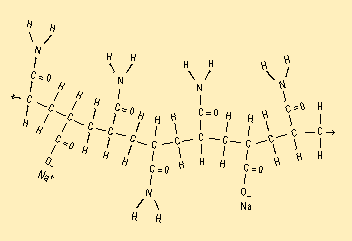1. n. [Drilling Fluids]
A linear copolymer of acrylate (anionic) and acrylamide (nonionic) monomers, also called partially-hydrolyzed polyacrylamide (PHPA). The ratio of acrylic acid to acrylamide groups on the polymer chain can be varied in manufacturing, as can molecular weight. Another variable is the base used to neutralize the acrylic acid groups, usually NaOH or KOH, or sometimes NH4OH. A concentration of approximately 10 to 30% acrylate groups provides optimal anionic characteristics for most drilling applications. High-molecular weight PHPA is used as a shale-stabilizing polymer in PHPA mud systems. It is also used as clay extender, either dry-mixed into clay or added at the rig to a low-bentonite mud. PHPA can also be used to flocculate colloidal solids during clear-water drilling and for wastewater cleanup. Low molecular-weight PHPA is a clay deflocculant.
Alternate Form: acrylamide acrylate polymer
